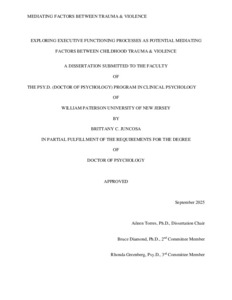Please use this identifier to cite or link to this item:
http://hdl.handle.net/20.500.12164/3474| Title: | Exploring Executive Functioning Processes as Potential Mediating Factors Between Childhood Trauma & Violence |
| Authors: | Juncosa, Brittany C. |
| Keywords: | Psychology;Cognitive flexibility;Executive functioning;Response inhibition;Risky decision making;Trauma;Violence |
| Issue Date: | 25-Feb-2025 |
| Publisher: | William Paterson University |
| Abstract: | Despite establishing a link between childhood traumatic events and perpetrating violent behavior in adulthood, research examining potential mediating factors has been limited. The purpose of this study is to begin examining the potential moderating factors between childhood trauma and violence in adulthood. The current study aims to focus on executive functioning processes given the empirically established role neurocognition plays in both trauma and violence. Specifically, this study will look at response inhibition, risky decision-making, and cognitive flexibility. Individuals who have experienced traumatic events during childhood and score (1) higher on measures of response inhibition, (2) lower on measures of risky decision-making, or (3) higher on measures of cognitive flexibility, were hypothesized to exhibit fewer violent behaviors in adulthood. Using an archival dataset of 224 participants, this study utilized the Early Trauma Inventory to measure history of childhood trauma, Stop-Signal Task to measure response inhibition, Cambridge Decision-Making Task to measure risky decision-making, and Stroop Interference Task to measure cognitive flexibility. The mediation analysis demonstrated that while response inhibition partially mediated the relationship between childhood trauma and violent behavior with a significant indirect effect, risky decision-making and cognitive flexibility did not exhibit significant mediating roles based on non-significant total and direct effects. Potential limitations were discussed, including the use of archival data and limitations in the measurement tools used. Overall, identifying neurocognitive factors that mediate childhood trauma and violence in adulthood has implications for both violence risk assessment and trauma-informed treatment. |
| URI: | http://hdl.handle.net/20.500.12164/3474 |
| Appears in Collections: | Theses & Dissertations |
Files in This Item:
| File | Description | Size | Format | |
|---|---|---|---|---|
| Juncosa_ExecutiveFunctioningChildhoodTrauma.pdf | 275.62 kB | Adobe PDF |  View/Open |
Items in DSpace are protected by copyright, with all rights reserved, unless otherwise indicated.
